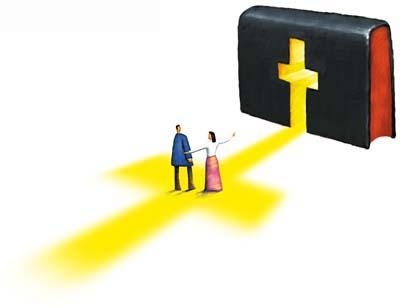Have
you ever thought about how the Bible is read? We call it the "Word of
God". Christians believe that when they are reading the Bible, God is
speaking to them. They believe that the Bible comes from God. When we read the
Bible we see God speaking to us with words, audibly, literally, and physically.
All this gives the impression that as we are reading the Bible what we are
reading are the actual words that God said to write. As if what we are reading
is the words God told some men two thousand years ago to put down on paper.
This
being the case, it seems that the most intuitive way of reading the Bible would
be to start with the assumption that everything written in it directly comes
from God. Thus, if the Bible says that squares are circles then we have to
believe that God says, "squares are circles". If the Bible says that
yodeling is for sissies then we have to believe that God says, "yodeling
is for sissies".
There
are two things which really fuel this idea. The first is that God does not lie
(Heb. 6:8). The second is that God makes clear His will (Rom. 1:25). God would
not confuse us by giving us a book which did not mean what it said. If God is
all-powerful then surely he has the ability to ensure that the interpretation
of the Word be as easy and plain as possible for readers of all time to be able
to follow its instructions. All this suggests that when we read the Bible the
primary, or preferred, method of interpretation ought to be the literal.
I
believe that this is represented by what is called Biblical Literalism, in our
day. What the Bible says ought
to be interpreted literally. Now this can be
applied differently. Some think that because they read the Bible literally it
means that the surface, or face-value meaning of the words is the authoritative
interpretation of scripture. Others think that to understand the Bible
literally means you have to delve into history to know what the author was
actually trying to say. Still others claim that to read the Bible literally we
have to harmonize, or in other words, create a hybrid text which actually
reveals to us the literal meaning of God's word. There are many ways to be
literal about the Bible, and you would think that since it is such an easy
method,or such a clear way, to know what God's will is for us today that there
would be more consensus on this matter.
In
a rather strange way, Biblical literalism forgets the very thing that makes a
book... a book. Books are not just written to be carbon copies of a persons mind,
nor are they written to be the sole representation of a past event. Books are
written to be timeless. Books are written to be immortal. Books are written to
be eternal. And when we make the Bible such an absolute authority we shed the
Bible of its mystery and depths that can only be plumed through the awareness that
God moves in ways unexpected.
When
I first came back to the Lord, I didn't want to take anything for granted, and
that especially included my Bible. I desired to understand it the way that
would contribute the most to my spiritual development and relationship with
God. I grew up in an area that is dominated by fundamentalism. Every Christian
believes that if the Bible says it then that's how God wants it, and that ends
it. There is this all to common belief among Christians that because the Bible
says something then that ought to end debate, questions, or inquiry into the
matter. This, of course, is merely an extension of the idea that the Bible
comes from God, but goes further to say that if something comes from God then
its authority is absolute.
I
began to study my Bible with this awareness that if it came from God then it
ought to have those qualities of authority and literalism that I was seeing
everywhere around me. But I found that there were certain things that what most fundamentalist Churches believed were not at all the literal interpretations of Scripture. In fact, it seemed that for the most part literal-orientated Churches were very accommodating to having symbolic or "spiritual" interpretations in those areas that were most self-serving to the Church. What I found were two very big problems. The first is
tithing, and the second is hell.
Every
church that I know of teaches tithing. Many churches do it with a Jedi mind
trick involved, but when pressed on the issue they believe that the Bible
teaches tithing and it is a thing that every Christian ought to be doing in
service to their God to support the church. I have talked to many pastors on
this issue, and have come to this conclusion fairly. This means that according
to the dominant view of the Bible proposed by the church I ought to be able to
read the Bible literally enough to determine that tithing is what God expects
of me. If I read the Bible literally and it does not conform to what most
churches say then it would seems that I either need to abandon the Bible all
together on the assumption that the only appropriate interpretation is the
literal, and hence Christianity, or that I need to reconsider what the
appropriate method of interpretation actually is.
The
word "tithe" is only mentioned twice in the New Testament. It's not
in the Epistles, which are dated earlier. The two times it is mentioned come
from the same story. Matthew and Luke both tell the story which means that the
New Testament only, really, has one mention of the word tithe, and here it is:
"Woe to you, scribes
and Pharisees, hypocrites ! For you tithe mint and dill and cummin, and have
neglected the weightier provisions of the law : justice and mercy and
faithfulness ; but these are the things you should have done without neglecting
the others" (Mat. 23:23).
Now
in reading the Bible literally it is important to not dismiss this verse simply
because there is only one mention of it. Jesus is clearly advocating tithing,
which means that we should assume God is advocating tithing. But to simply
single out this one aspect of this verse would be to pick and choose what can
be literally seen in this verse. Another thing which is clearly in this verse
is that Jesus is speaking to the Pharisees, or he is speaking about the
Pharisees. The other thing to notice is that Jesus is speaking about past
events. He is not saying that the Pharisees should tithe in the future, he is
saying that in the past Pharisees should HAVE tithed without neglecting
justice.
This
does not negate the force of what Jesus is saying about tithe. But it does give
us some considerations that need to be addressed. First, Jesus is not giving a
direction to his disciples as to how he wants them to behave. In fact, when it
comes to giving the only thing Jesus directs them to is the widows
"mite" (Mark 12:43). Jesus could have taught them about tithe at that
moment, but he didn't.
The
reality is that the New Testament church did not practice tithing. Jesus' words
are hardly indicative of any normative quality in the lives of the believers,
and Christ only offers those words as a critique of a group of people that existed
outside the influence of those who followed Him. If we are going to take Jesus'
words concerning the Pharisees as normative for Christians today then we might
as well take seriously his call for the "Rich Young Ruler" to sell
all he owns so that he could follow Jesus (Mark 10:21).
Plus,
we do have many teachings in the Epistles as it concerns generosity, giving,
and supporting the church that makes no mention of tithing (1 Cor. 16, 2 Cor.
8-9). Paul tells believers to decide in their hearts what to give. He tells
believers that giving should not be a burden for the poor. The rich should give
more, and the poor should not be expected to give. Paul's teaching on giving is
vastly different then the teaching on tithing. Paul had plenty of chances to
call his teaching on generosity an extension of tithing, but he did not.
As
far as Paul was concerned tithing was simply a part of the Law which was over,
finished, ended (Gal. 3:25). Interestingly enough, if we are going to take a
literal position on tithing then we would have to apply the same understanding
to tithing as it was represented in the Bible. Clearly, tithing has nothing to
do with the New Testament. So if Christians are expected to tithe based on the
literalness of the Bible then we should see what the Bible literally says:
" 'A tithe of
everything from the land, whether grain from the soil or fruit from the trees,
belongs to the LORD; it is holy to the LORD." - Leviticus 27:30
What
was the tithe? And what wasn't it? The tithe was not income based. In a market
economy the tithe is almost entirely senseless. The tithe only applied to
landowners. And it only applied to farmers and herdsmen. Whatever the land
produced either in produce, or animals was considered as tithe-worthy. This is
the literal meaning of tithe. It was not a universal, all encompassing, command
on the people of Israel. In today's society it would be business owners who
paid the tithe, but that is only conjecture.
What
the Bible tells me about tithe almost turns the whole enterprise of the church
on its head. A Church which both accepts tithes and promotes Biblical
literalism is making such an affront to border on blasphemy, but we do not have
to go that far. But one word definitely seems applicable. Hypocrite.
Tithing
is one thing that no literalist can actually take literally, it simply does not
seem possible, but it is very likely that most literalists believe and practice
tithing. Thus, if the application of symbolic or "spiritual" meaning
in the Bible is to be limited as much as possible it seems that this dictum is
not followed at all when it comes to tithing. Why not simply follow, preach,
and teach what Paul says in the Corinthian epistles? Why make it more
confusing? More complex? My desire for simplicity was helping me see how easy
the first believers tried to make things on the early church. But I still
needed to know how to find direction two thousand years later.
It
seemed that Biblical literalism had a strike against it.

















